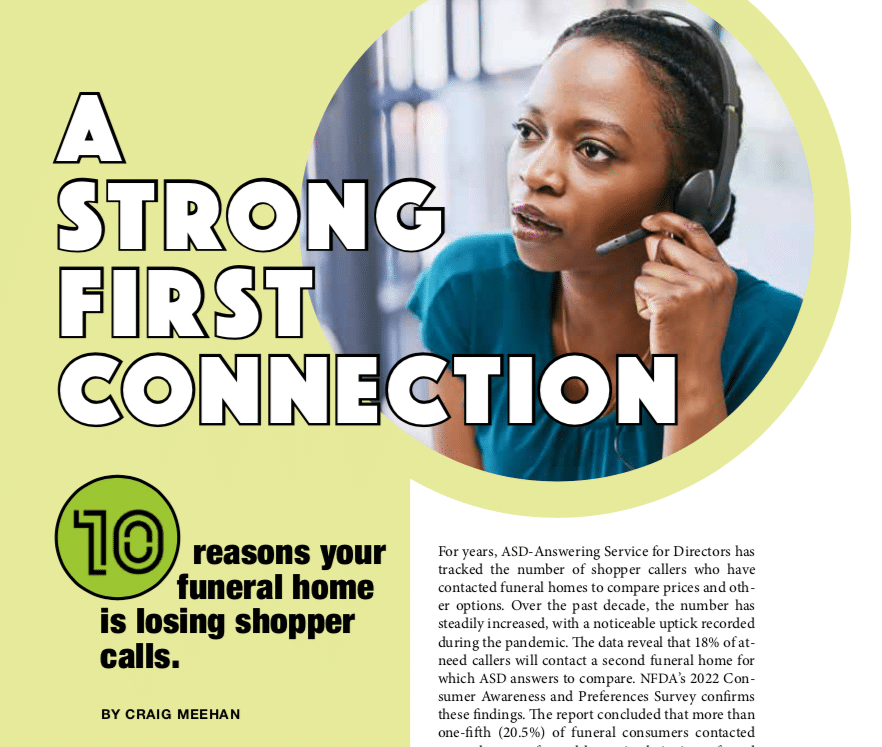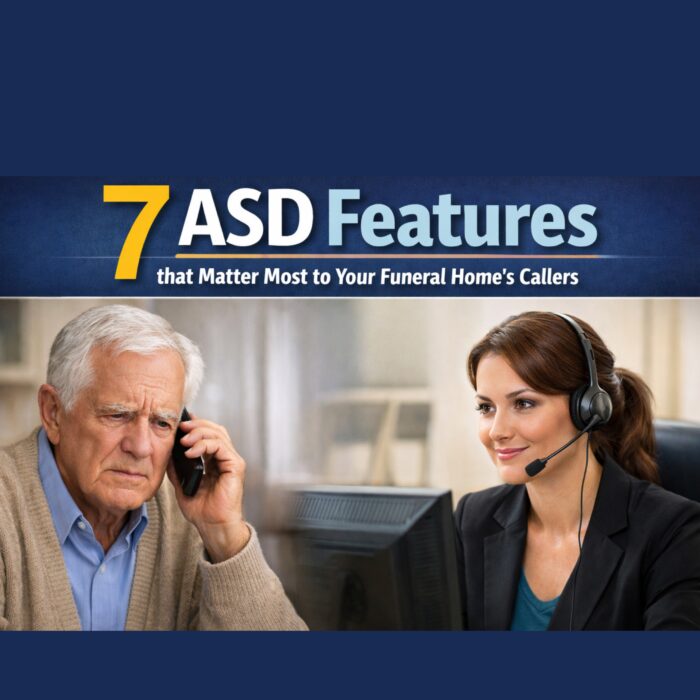
Originally published in the February 2023 Issue of The Director magazine by ASD National Sales Manager, Craig Meehan. NFDA Members – please click here to access the digital version of the magazine.
A Strong First Connection
10 Reasons Your Funeral Home Is Losing Shopper Calls
In the face of an economic downturn, the number of cost-conscious families wishing to compare funeral service options seems certain to rise. Funeral homes must be prepared to capture these potential business opportunities or risk losing market share to a discount competitor. When it comes to winning over shopper callers, many funeral professionals struggle to form a connection and end up striking out.
For years, ASD – Answering Service for Directors has been tracking the number of shopper callers that have contacted funeral homes to compare prices and other options. Over the past decade, this number has steadily increased with a noticeable uptick recorded during the pandemic. The data reveals that 18% of at-need callers will contact a second funeral home ASD answers for to compare. NFDA’s 2022 Consumer and Preferences Report confirms these findings. The report concluded that more than one fifth (20.5%) of funeral consumers contacted more than one funeral home in their time of need last year.

As a funeral home owner, you may not find these numbers especially alarming, especially if you are not located in a competitive market. However, current data indicates that by the year 2040, there will be approximately 1 million more deaths per year than today. There may be times when you are so busy that you do not want to make a great deal of effort to capture new cases. However, it is important to maintain a long-term vision and keep in mind that even if shopper calls do not impact your bottom line today, they very well may in the future.
Recently, with permission from a select group of funeral homes, I conducted research to determine why so many of these shopper calls are calling another funeral home. In this article, I will share 10 of the most common reasons why I believe funeral homes are missing out on these valuable sales opportunities along with actionable steps for improving your shopper call outcomes.
1. You’re not explaining the value your firm provides
You’ve likely heard it before, but it bears repeating – you must sell funeral consumers on the value your funeral home provides. What sets you apart from other firms in your market? What are some key features families will find at your funeral home that they will not find elsewhere?

How does your funeral home stand out from others?
Whether it is your funeral home’s history, facilities, investment in the community, technology options or some other quality, everyone on staff should know your funeral home’s core value proposition. This is arguably the most crucial element of your overall marketing messaging. Come up with a few key phrases your on-call directors can use to better communicate the value your firm provides when speaking to shopper callers. If callers are only given prices and not your funeral home’s core value proposition, they have zero reason to choose your funeral home over a discount competitor.
2. You’re not listening to what the callers are really saying
Did you know that when ASD patches a price shopper to the funeral home’s on-call staff, the call will continue to record even after our Call Specialist disconnects from the line? To get a better understanding how funeral homes can improve their shopper call outcomes, I reviewed many of these recordings and I discovered one common reason why many funeral professionals are not connecting with shoppers – they don’t listen!
It’s important to keep in mind when I say shopper callers, I am not just talking about those who want to know the cheapest price for direct cremation. Callers want to understand what their options are and they’re seeking a funeral home that can meet a specific need. Chapel space, cremation options, schedule availability and many other factors can play a part in their choice of funeral home.

The 2022 NFDA Consumers and Preferences Report found that 55% contact more than one funeral home to compare price. That means nearly half of shopper callers don’t even care about price! Other considerations included availability (50%), checking available service options (36.9%), finding a convenient location (33%), reputation (27%), customer service (27%) and family or friend recommendations (17%).
In one call, for example, a family with a very specific religious need inquired about the funeral home’s prices for a full-service funeral. Rather than just answering the caller’s very direct question, the director explained why it would be cheaper to select a different option. By assuming the family would only be motivated by price, they undercut their own sale. I believe this is at the root of why so many are losing shopper calls—funeral directors very often incorrectly assume that all callers only want prices and will sometimes outright ignore what they are actually being asked.

If you or your on-call staff is in the habit of responding to shopper calls by immediately launching into recycled spiel that does not take into account the individual needs of the family, that disengagement will absolutely come across. The days of reading the GPL over the phone need to come to an end.
Make it a point to always listen actively to shopper callers and demonstrate a genuine desire to build a relationship. Answering every question with a price-assumption in mind neglects what these consumers are really asking: why should they choose your funeral home? If you think the only answer is price, you are devaluing your own business.
3. Telephone etiquette is lacking
In addition to failing to listen, one of the other deadly sins of shopper calls is sounding impatient, insincere or unintelligent. I get it. Shopper calls can come at any time. You may have just been awakened from a great dream or perhaps you just put your gloves on to start an embalming. However, that caller on the line is likely having one of the most difficult days of their lives. Sensitivity can never be compromised in this business, and that rule must include telephone interactions also.

For example, during one of the calls I listened to, a caller requesting prices was immediately told, “We are closed today so I won’t be able to send you anything.”That type of statement is deeply problematic and reveals a strong lack of interest. You should strive to ensure your language and cadence conveys to callers that you appreciate that they want to do business with your funeral home.
Here are some compassionate communication dos and don’ts
-
-
- Do… introduce yourself – this helps establish a human connection right out of the gate
- Do… ask for their name and use it throughout the call
- Do…make an effort to ensure your tone of voice conveys empathy
- Do…match the talking speed of callers and take frequent pauses to ensure you are not speaking too quickly.
- Do… refer to their loved one by their relationship (“mom”) or first name, not as “the deceased.”
- Don’t… use confusing funeral jargon or phases that might be perceived as insensitive
- Don’t… interrupt callers while they are speaking
- Don’t… sound rushed or in a hurry to get off the phone
-
4. Your telephone connection is poor.

One of the quickest ways to repel a shopper caller is to make it difficult for them to understand you on the phone. Take steps to ensure your telephone connection will be clear and free of static or other background noise. No one wants to have to shout or repeat themselves to be heard. This will very quickly lead someone to say, “I’ll just call back” before promptly dialing the number of your closest competitor. While there may still be areas of the country where cellular reception is often poor, there are now solutions such as Wi-Fi calling that can help you guarantee this won’t be an issue. The investment is well worth the peace of mind knowing that you won’t ever lose a shopper call because of a poor telephone connection.
5. Shopper calls are delegated to the most inexperienced employees
Obviously, handling shopper calls after hours is not the most desirable task for funeral home professionals. For this reason, it is often delegated to the lowest rung on the ladder. In many funeral homes, apprentice morticians and funeral directors who are still learning the ins and outs of the business are the ones handling those late-night phone calls from at-need families who are price shopping. In some cases, the person may not be a licensed funeral professional at all. This is occurring more frequently today as many funeral homes across the country are dealing with a labor shortage and need their most experienced directors to remain focused on the families already in the funeral home’s care.

By providing your less experienced on-call directors with support, training and oversight, you can have peace of mind they will represent your business in the same manner you would. One way to ensure this is to record your staff’s telephone interactions with families who are shopping. Devoting time to listening to these call recordings will allow you to determine areas in need of improvement and help your team rise to your expectations.
Operating a funeral home requires a range of different skill sets. From embalming and restorative arts to event planning to finance, there are many different types of tasks that must be accomplished in a funeral home. For this reason, it is not uncommon for a funeral home employee to excel in a particular area but struggle with another. It is probable that some of your staff members may feel more comfortable handling shopper calls than others do. This makes it even more imperative for funeral home owners to take time to educate their employees on best practices for handling shopper calls. This type of constructive conversation will instill confidence in your staff, help them to recognize areas where they can improve and motivate them to make a lasting connection with callers.

Here are a few best practices for shopper call training:
-
-
- Schedule employee meetings to go over call recordings and difficult scenarios.
- Find examples of shopper calls that were handled well, and ones that were handled poorly.
- Come up with a few key phrases your on-call directors can use to better communicate the value your firm provides.
- Discuss alternative ways to answer common questions.
- Invite your staff to share common dilemmas they run into when handling shopper calls and brainstorm solutions as a team
-
6. You are not being transparent
Funeral directors are required by law to provide general pricing information to anyone who requests it over the phone or in person. In the coming months, the Funeral Trade Commission (FTC) will decide it funeral homes will be additionally required by law to publish their prices on the funeral home website. Obviously, this is a contentious issue and there is good reason to support the funeral homes and associations who believe the decision to publish pricing on a funeral home website should be a business decision, not a government mandate. However, while I agree the choice should be left with the funeral home owner, I do believe it makes good business sense for funeral homes to make their GPL easily accessible to families.
Here’s why.
When handling a shopper call, you have a limited amount of time to make a connection with that caller and demonstrate you are the right funeral home for them to trust with their loved one. If you spend all of those precious moments reading your GPL off like a restaurant server giving the daily specials, your chances of winning over that family are significantly diminished. In some cases, families may not even call your funeral home if your prices are not published online because they will assume your lack of transparency must mean your prices are out of their range. Conversely, if you publish your GPL online and also make it a point to preemptively send it via text to price shoppers so they have it in front of them, you can focus all of your attention on selling your funeral home’s value.

7. Shopper calls are viewed as low value and not worth your time.
When it comes to winning over shopper callers, many funeral professionals end up caught in a vicious cycle. They have stopped trying to make an effort to connect with shopper callers because they believe these inquires most often lead to naught. As a result, they come off as disinterested on the phone to the caller who unsurprisingly choses a different funeral home, and thus the cycle continues. The root of this issue is a misconception on the part of the funeral home owner that price shoppers are low value consumers who are not worth their time.
In the past, funeral homes could rely on business from their legacy families they knew would always come to their funeral home in their time of need. Today, many of those relationships have begun to erode as a result of the pandemic and families searching out more affordable options. Funeral home owners who dismiss those who want to compare options and assume they must not be qualified buyers are taking a dangerous risk. Relying solely on the enduring loyalty of legacy families without making any attempt to connect with shoppers is the very definition of putting all your eggs in one basket. Funeral professionals must learn to change this outdated mindset.

Shopper callers are not low value consumers – they are uncommitted families. They are simply those who have no current ties to a funeral home. Maybe they are new to the area or perhaps this is their first time planning a funeral for someone. If you can win their business and prove to them you are the right funeral home for their family, they will likely come back to your funeral home again if the need arises in the future. However, this only happens if you break the vicious cycle and change your perception of shopper calls.
8. You’re not taking advantage of new technology solutions
It should be no surprise to anyone that the expectations of consumers have been irreversibly altered by the pandemic. This has happened across every business sector including the funeral profession which has often been labeled as slow to adapt to change. Technology can never replace the human interactions funeral professionals share with families, but it can make it easier to communicate in our increasingly remote world.

It’s not just about prices anymore – it’s about the convenience of the family and how well you can accommodate their wishes. Can they make arrangements online? Can you help them with the creation of a memorial slideshow video? Do you offer live streaming for loved ones that live far away? Can you host a memorial website for their loved one? As time goes on, funeral homes that can’t or chose not to meet these requests will be viewed as inferior to those that can.
In addition to service options and features, expectations have also shifted in regard to how funeral homes communicate with families. For instance, in the past, using text messaging may have felt unprofessional or impersonal, especially when working with older folks. Today, people from every generation not only expect to interact via text with the companies they do businesses with, they usually prefer it. Text messaging can prove to be a very useful tool when handling shopper calls as you can put information right into the caller’s hands. New solutions that allow funeral homes to text using the funeral home’s phone number can also help to facilitate this.

Think older folks aren’t interested in using text messaging? Think again! A 2018 AARP study found that 86% of Americans over the age of 80 communicated using texting.
9. You’re not asking the right questions
You may think the best approach on a shopper call is to simply answer the questions asked and provide the necessary details to the caller. While this is certainly an important part of the equation, there are several key pieces of information that should be ascertained from the call. Use discovery questions to encourage callers to tell you more about themselves and their situation.

Important questions to ask shoppers
- Have we served your family before? (this will help you determine how much they already know about your funeral home)
- Did your loved one have any specific funeral wishes?
- Has anyone taken the time to explain to you the different options?
- How did you hear about our funeral home?
- Can we follow up with you at a later time? (Ask to schedule an appointment or for a phone number or email address to send more information)
10. You focus too much on insignificant details
Understanding exactly how to read and interpret a funeral home’s GPL is not an exact science. This is the reason why some funeral directors are still hesitant to provide upfront pricing – they want to be able to explain anything that might be confusing. However, many funeral professionals fall into the trap of wanting to define every aspect of their price list and focus too much on small matters such as the cost of extra death certificates or the removal of a pacemaker before a cremation. In many cases, they will go into a long explanation of something that doesn’t even apply to the family’s specific situation. For instance, clarifying why there is a cosmetology and casketing fee that is separate from your embalming fee only to discover the family does not even want their loved one embalmed. Remember that you have a limited amount of time to convince the caller you are the right funeral home for them. Don’t squander the opportunity by telling them things they don’t need to know.
Final Thought
As Warren Buffet famously said, “Price is what you pay. Value is what you get.” Take steps today to ensure that families who are shopping for a funeral home understand the value they will get if they choose you.

RELATED READING
4 Things You Can Do Today to Improve Your Funeral Home’s Customer Service
5 Ways ASD Can Help Your Funeral Home Run More Efficiently
5 Proven Ways to Improve Your Shopper Call Outcomes
About The Author
Jess Farren (Fowler)
Jess Farren (Fowler) is a Public Relations Specialist and Staff Writer who has been a part of the ASD team since 2003. Jess manages ASD’s company blog and has been published in several funeral trade magazines. She has written articles on a variety of subjects including communication, business planning, technology, marketing and funeral trends. You can contact Jess directly at Jess@myASD.com


